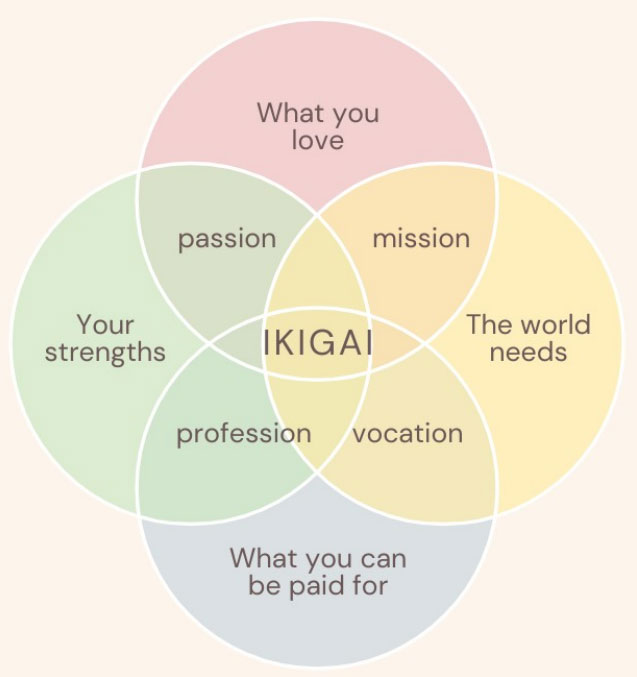
Ikigai: How to find a sense of purpose in your career
Ikigai loosely translates to “reason for being” and is a Japanese concept relating to the balance between four things: what you love, what you are good at, what the world needs, and what you can be paid for. In the pursuit of Ikigai, one strives to achieve a sense of fulfilment which is practical and useful, both for the individual and the wider world; it is, for many, the ultimate goal.

We are all familiar with the adage that “if you find a job you love, you will never have to work a day in your life”. Whilst that may be true for some, for many people this proves elusive, or is overshadowed by the need to do something which also provides sufficient remuneration. Ikigai seeks to solve this dilemma by asking “what does the world need?”, thus providing a route to discovering how you can be paid for doing what you enjoy.
Ikigai does not necessarily need to be rooted in work. A study in Japan suggested that factors pertaining to income and financial benefit were more closely associated with Ikigai in men, but for women family and psychological factors were more prevalent. And the benefits don’t stop in the workplace. Research amongst university students revealed that Ikigai-based skills training “enabled students to discover personal strengths and core values, and to clarify a sense of purpose” which taught them “key skills in self-leadership”. Studies have also demonstrated that higher levels of Ikigai were associated with a lower risk of cardio-vascular disease mortality.
Notwithstanding these wider benefits, finding a sense of purpose in your career can be hugely valuable. We spend a significant proportion of our days (and our lives!) working, so using Ikigai as a tool to evaluate your goals can be a very useful starting point for anyone embarking on a new job search. As recruiters, we see people looking for a new job for a multitude of reasons: money, company values, and lack of progression, to name but a few; all of which can lead to a sense of dissatisfaction, of one’s work not being aligned with one’s personal goals or sense of fulfilment. It’s important therefore for us, as recruiters, to understand what really motivates you and what your values are, as longevity and success in a role only comes when these things are aligned as between employer and employee.
If the idea of ever being truly passionate about your work feels like too much of a pipedream, do not be deterred. Perhaps you prefer to “work to live” and find a sense of fulfilment in knowing that your paid employment allows you to pursue your interests outside of work instead – identifying those interests and making peace with that fact can be equally beneficial to your sense of career satisfaction.
There is no universal route to achieving Ikigai, but the Venn diagram is a useful starting point and helps to focus the mind and bring a sense of purpose to any job search. By identifying those things you love and are good at, you can start to think about what the world needs; remember, your skills and interests are valuable and important – use them to your advantage!
Reference
- Shirai, K. et al (2006) Factors associated with “Ikigai” among members of a public temporary employment agency for seniors in Japan; gender differences, Health Qual in Life Outcomes, 2006, 4:12
- Hall, D. et al (2023) Impact of defining ikigai in developing future-ready university graduates with self-leadership skills: a whole university mixed-methods study during Covid-19, Asia Pacific Journal of Education, vol.43, issue 3
- Miyazaki, J. et al (2022), Purpose in life (Ikigai) and employment status in relation to cardiovascular mortality: the Japan Collaborative Cohort Study, BMJ Open 2022

Charlotte is a former barrister and specialist legal recruiter with a wealth of experience placing fee earners and legal support professionals in the Cayman legal market. She is highly regarded as an experienced, professional and knowledgeable legal recruiter with an extensive network of industry contacts.

